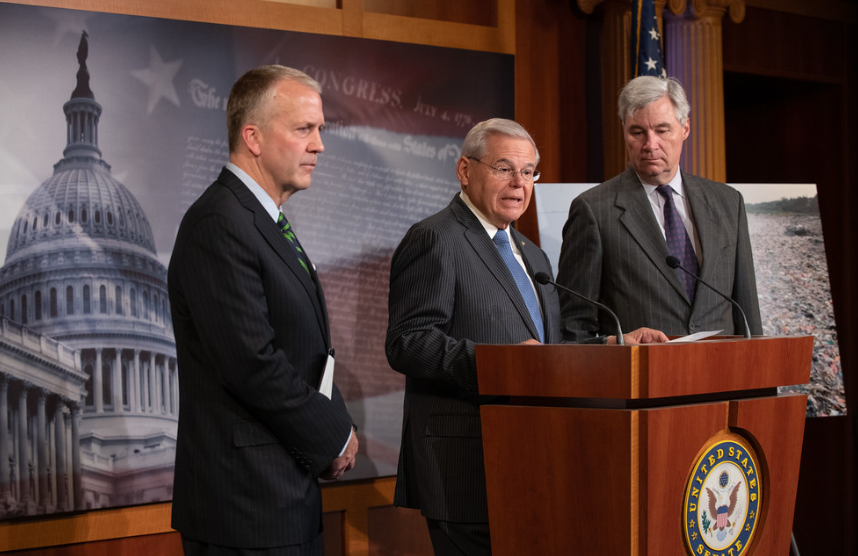Menendez, Whitehouse, Sullivan Launch NewBipartisan Strategy to Tackle Plastic Waste Flooding Our Oceans, Washing up on Our Shores

Menendez, Whitehouse, Sullivan Launch NewBipartisan Strategy to Tackle Plastic Waste Flooding Our Oceans, Washing up on Our Shores
Harmful plastic waste – generated mostly overseas – requires global response, American leadership
WASHINGTON, D.C. – U.S. Senators Bob Menendez, ranking member of the Senate Foreign Relations Committee, Sheldon Whitehouse (D-R.I.) and Dan Sullivan (R-Alaska) today unveiled the Save our Seas 2.0 Act, comprehensive and bipartisan legislation to tackle the plastic pollution crisis threatening our oceans and shorelines, our marine life, and our coastal economies.
The Save Our Seas 2.0 Act (S. 1982) is designed to spur innovation and help reduce the creation of plastic waste, find uses for already existing plastic waste to keep it from entering the oceans, and tackle this problem on a global scale. The plan builds on the progress made by the Save Our Seas Act, which was signed into law last fall.
“The Jersey Shore attracts millions of visitors each year and our coastal waters support everything from fishing and recreation to the flow of trade through our ports and harbors,” said Sen.Menendez. “There’s not a single person who wants to swim in plastic debris or catch fish that fed on microplastics. As we grapple with the implications of plastic waste, most of which comes from overseas, we must exercise our global leadership. That’s why as Ranking Democrat on the Senate Foreign Relations Committee I’m proud that Save Our Seas Act 2.0 includes a real focus on using our foreign policy and international cooperation to combat plastic pollution abroad.”
Most of the world’s plastic pollution in our oceans comes from foreign sources like China, India and the Philippines. The plastic breaks down into tiny pieces that can enter the marine food chain and harm fish and wildlife, and wash ashore on even the most remote stretches of coastline. Plastic has been found in areas as remote as the Mariana Trench, the deepest known point in the ocean.
“Ocean plastic is a complex global issue, but it’s a challenge we can solve if the United States puts energy into leading on this and investing in creative solutions,” said Sen. Whitehouse, who cofounded the bipartisan Senate Oceans Caucus to find common ground in responding to issues facing the oceans and coasts. “The Senate has established a great bipartisan tradition of protecting the oceans. I’m glad to once again partner with Senator Sullivan and our colleagues on legislation to help eliminate the plastic waste washing up on beaches and in fishing nets from Rhode Island to Alaska, and winding its way into the human food chain.”
“The prevalence of marine debris in our oceans is a chronic issue, one that threatens not only fisheries in my state of Alaska, but the health of the oceans and communities across the country, and across the globe,” said Sen. Sullivan. “The good news is that this is one environmental issue that is solvable, actionable, and measurable. SOS 2.0 will work to enhance our response here at home and across the globe. It will also work to prevent waste from getting into our oceans in the first place. Once again working with my friend Senator Whitehouse, SOS 2.0 has the support of the private sector, environmental groups, and both the legislative and executive branches. With all of us pulling on the same oar, we have the opportunity to solve this global challenge together.”
The Save Our Seas 2.0 Act is cosponsored by Sens. Cory Booker (D-N.J.) Susan Collins (R-Maine), Lisa Murkowski (R-Alaska), Tom Carper (D-Del.), Rob Portman (R-Ohio), and Chris Murphy (D-Conn.). A detailed summary of the legislation is available here.





